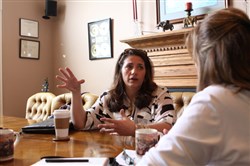VOL. 37 | NO. 38 | Friday, September 20, 2013
Helping musicians strike a healthy chord
By Jeannie Naujeck

Tatum Hauck Allsep (center), executive director with Music Health Alliance talks with Shelia Shipley Biddy (right), a long time music industry executive along with Kimberly Dunn, also with Music Health Alliance during a strategy meeting.
-- Michelle Morrow | Nashville LedgerMusic Health Alliance is offering assistance in navigating the health care system specifically to members of the music industry.
MHA was launched in January 2013 to help musicians, songwriters and affiliated professionals understand their health care options and direct them to insurance plans and other resources that meet their needs and fit their budget. Its mission is to “protect, direct and connect,” says founder Tatum Hauck Allsep, a music business veteran herself.
MHA counselors assist an average of 25 clients per week. Allsep says in the first quarter of this year alone MHA saved its clients more than $57,000 in insurance premiums, secured over $1 million in financial assistance and saved four families from filing for bankruptcy.
The group is funded through donors and grants, making advisory services to clients free of charge.
Due to the fluctuating nature of songwriters’ and musicians’ incomes – songwriters, especially – some clients learn they qualify for Medicaid and other government-sponsored plans. Thirty-two MHA clients were moved to state health plans and 11 clients were moved to federal health plans in the first quarter. Others who have had no luck getting an affordable commercial plan on their own find one with MHA’s help.

Tatum Hauck Allsep, left, talks with Shelia Shipley Biddy during a strategy meeting.
-- Michelle Morrow | Nashville LedgerStill others find they can save substantial amounts on premiums and out-of-pocket expenses by switching from the plans they already have. Allsep says many clients have been sold expensive supplemental policies that jack up their premiums without offering value in terms of covering their immediate health needs.
“We’ve got this fragmented system and when you’ve got creative people immersed in that, sometimes they get caught up in it,” Allsep explains. “Then it becomes crisis management but our ultimate goal is to build a preventative mentality.”
With the launch of the online marketplace, Allsep and her staff will have a new array of plans about which to advise clients. Because working musicians tend to spend much of their income on gear that is a business rather than a personal expense, many will qualify for subsidized premiums.
“If you fall below the income threshold, the subsidies are going to be great,” Allsep adds. “And not being able to rate people based on their health conditions is humongous.”
For people who are entrepreneurs – most of the music industry is self-employed, so having access is going to be a great thing for a lot of people.”
Drummer John McTigue III is the type of person who will benefit from the new online marketplace. A musician who draws his income by touring, doing session work and playing local gigs, McTigue doesn’t have a problem with access. He’s had an insurance policy for years with a large national carrier, but watched with frustration as his premium kept rising despite staying healthy and in shape and not making any claims beyond the occasional minor illness or accident.
Based on his current taxable income, in January McTigue will likely be able to reduce his current insurance premium by two-thirds by switching to a plan offered on the exchange through a different carrier. The plan will not only cost less, but also give him benefits equal to or better than his current plan.
“As a working musician, you learn to stay on budget and to keep your expenses low,” McTigue says. “It means a lot to save that kind of money. It’s a significant amount.”
Because he is in good health and has no regular prescriptions or chronic conditions that necessitate regular doctor visits, McTigue learned that he can also cut his monthly premiums by 40 percent until the end of the year when the exchange kicks in by switching to a plan that covers major medical needs with a much lower deductible than his current plan – a so-called catastrophic plan.
For minor illnesses such as the flu, he can utilize the low-cost quick-care clinics found in many drugstore chains such as CVS and Walgreens. And should he develop a chronic or critical illness before January 1, under the new law he cannot be turned down for his policy.
As his taxable income fluctuates from year to year, McTigue’s share of his premium will vary but for next year, at least, he will save money through the exchange. It’s something he says he might not have known about had he not contacted MHA.
“I’ve heard a lot of hoopla about the new health care law, but I didn’t know quite how it would affect me,” McTigue adds, of going to the Musicians Health Alliance for advice.
“It’s a lot to take in, and it’s a blessing to have people in this industry who care, because you never know what can happen.”
While Allsep and her staff are licensed insurance brokers by necessity, and are credentialed to work with the exchange plans, any commissions they receive go straight into the “Jack Pot,” a fund set up in honor of the late Cowboy Jack Clement to pay health care costs for musicians in need, Allsep says.
Staff members receive no incentives to direct clients to any particular health plan, eliminating the potential for a conflict of interest.
“I wish we could do this for Realtors and chefs and hairdressers … there are so many people who fall into the self-employed category and I wish we could help all of them,” Allsep says.
She advises consumers not to let frustration get the best of them, and to reach out with questions and utilize the resources that are available.
“It (the exchange) is going to be pretty intimidating to begin with, and people will shy away from it for that reason and just take the tax penalty the first year,” Allsep adds.
“But I think this is the first step of many steps. I’m not sure it’s the right solution but it’s a start, and we have to start somewhere.”